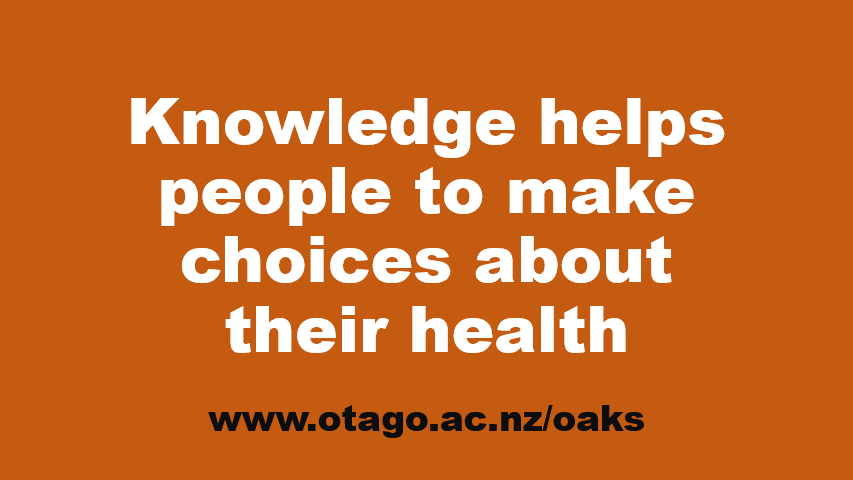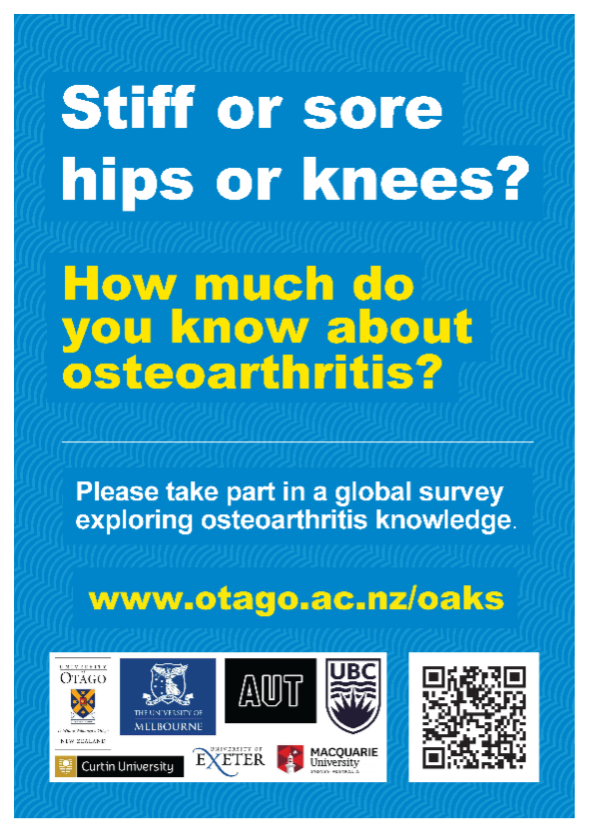Knowledge empowers people to understand their health and make choices about how to manage it. For people who have osteoarthritis, knowledge and beliefs influence their physical activity levels, participation in social and leisure activities, support-seeking and management decisions, and their wellbeing.1 2 Osteoarthritis has an enormous (and rising) burden on individuals and societies worldwide,3 so it is vital that we develop effective interventions to reduce this burden.
Education is core care for people who have osteoarthritis
Enhancing knowledge through education represents a key opportunity to improve the health of people who have osteoarthritis. As a result, education to improve knowledge is core recommended care for people who have osteoarthritis.4 People who receive new information about osteoarthritis report that this is empowering and can stimulate positive behaviour change.5
How do we know what people know about osteoarthritis?
Currently, we have no valid or reliable tools to measure people’s osteoarthritis knowledge. This means that we cannot reliably tell when there’s an opportunity to improve knowledge, nor can we test whether educational interventions enhance knowledge, nor can we explore whether improvements in health outcomes are mediated by changes in knowledge. This is an important gap that limits our ability to optimise osteoarthritis treatment.

Creating the OsteoArthritis Knowledge Scales (OAKS)
International agreement about knowledge that is important for people who have hip or knee osteoarthritis6 and subsequent qualitative interview work with people who have osteoarthritis7 8 has provided the opportunity to develop new tools to measure osteoarthritis knowledge.
An international team from Australia, Canada, New Zealand, and the UK has formed to develop osteoarthritis knowledge scales. This team includes experts in osteoarthritis (lived experience, research, and clinical care), health beliefs, measurement and analysis. In addition to a person with lived experience being a member of the core research team, 28 research partners with lived experience of osteoarthritis from NZ, Australia, Canada, and the UK helped to develop the scale items.
The new scales are called the Hip Osteoarthritis Knowledge Scale (HOAKS), and the Knee Osteoarthritis Knowledge Scale (KOAKS). These scales are now being tested through the Osteoarthritis Knowledge Survey. You can read more about the scales’ development and the survey in an open access publication.
A call to action – make sure your country is represented
We want responses to the Osteoarthritis Knowledge Survey from English-speaking people worldwide. The more diverse the participants, the better we can test whether the scales will perform well for people from different locations and backgrounds. Translations into other languages are already underway.
We have had good responses from New Zealand and Australia, but fewer from other countries. Osteoarthritis is a global challenge to health, so we want to develop a tool that can test knowledge across cultures and locations.
We are challenging sports and exercise clinicians in the United Kingdom, United States, Canada, India, Nigeria and South Africa to get your countries represented.
- Put a poster up in your clinic
- Send the survey link to patients and athletes who have hip or knee osteoarthritis – https://otago.au1.qualtrics.com/jfe/form/SV_1CgOhNFLyn7MeHP
- Share this blog or information about the study with your networks (otago.ac.nz/oaks)

Authors and Affiliations:
By Ben Darlow (@BenD_NZ), on behalf of the OsteoArthritis Knowledge Scales (OAKS) team.
- New Zealand: Ben Darlow, Jane Clark, Mely Brown, Haxby Abbott, Daniel O’Brien, James Stanley, and Chris Krägeloh
- Australia: Andrew Briggs, Rana Hinman, Kim Bennell, Simon French, and Ben Metcalf
- Canada: Jackie Whittaker
- United Kingdom: Sarah Dean
References:
- Holden DM, Nicholls ME, Young MJ, et al. The role of exercise for knee pain: What do older adults in the community think? Arthritis Care Res 2012;64(10):1554–64. doi: 10.1002/acr.21700
- Wallis JA, Taylor NF, Bunzli S, et al. Experience of living with knee osteoarthritis: a systematic review of qualitative studies. BMJ Open 2019;9(9):e030060. doi: 10.1136/bmjopen-2019-030060
- Vos T, Lim SS, Abbafati C, et al. Global burden of 369 diseases and injuries in 204 countries and territories, 1990-2019: a systematic analysis for the Global Burden of Disease Study 2019. The Lancet 2020;396(10258):1204-22. doi: 10.1016/S0140-6736(20)30925-9
- Bannuru RR, Osani MC, Vaysbrot EE, et al. OARSI guidelines for the non-surgical management of knee, hip, and polyarticular osteoarthritis. Osteoarthritis Cartilage 2019;27(11):1578-89. doi: 10.1016/j.joca.2019.06.011
- Darlow B, Brown M, Grainger R, et al. Stakeholder views about a novel consumer health resource for knee osteoarthritis. Osteoarthritis and Cartilage Open 2020;2(2):100058. doi: https://doi.org/10.1016/j.ocarto.2020.100058
- French SD, Bennell KL, Nicolson PJ, et al. What do people with knee or hip osteoarthritis need to know? An international consensus list of essential statements for osteoarthritis. Arthritis Care Res 2015;67(6):809-16.
- Darlow B, Brown M, Thompson B, et al. Living with osteoarthritis is a balancing act: an exploration of patients’ beliefs about knee pain. BMC Rheumatol 2018;2(1):15. doi: 10.1186/s41927-018-0023-x
- Bunzli S, O’Brien P, Ayton D, et al. Misconceptions and the Acceptance of Evidence-based Nonsurgical Interventions for Knee Osteoarthritis. A Qualitative Study. Clin Orthop Relat Res 2019;477(9):1975-83. doi: 10.1097/corr.0000000000000784